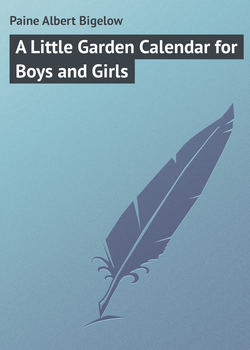Читать книгу A Little Garden Calendar for Boys and Girls - Paine Albert Bigelow - Страница 10
FEBRUARY
V
THE HONEYSUCKLE TWINES ALWAYS TO THE LEFT
Оглавление"Away back in the days that came after Eden, the time I told you of, when the garden was given up to weeds and the plants went wandering out through the world, a certain morning-glory and climbing-bean were good friends, and were often found together – twining up the same little tree or trellis, and very happy. Of course they were not called morning-glory and bean then, and the honeysuckle that grew near was not called honeysuckle either, though it had just the same sweet flowers, and the humming-birds came to suckle honey from them, just as they do now, in summer-time. I don't know what the old names were. It has been so long since then, I suppose they are all forgotten.
"Now the honeysuckle was very proud of its sweet flowers, that scented all the air around and drew the beautiful humming-birds, while the morning-glory and bean had only very pale little flowers that the humming-birds did not care for at all.
"And the honeysuckle used to laugh at them, and tell them how plain and useless they were. How they lived only a little while in summer, and withered when the frost came, while it only shed its leaves, and stood strong and sturdy against the wind and cold of winter, ready to grow larger and more useful each spring. And this, of course, made the two friends feel very sorry, and wish they could be beautiful and useful, too.
"Now, one day in early spring, the sun, who makes the plants grow and gives the colors to the flowers, heard the honeysuckle, which was putting out green leaves on its strong vines, laughing at the bean and morning-glory, that were just peeping from the earth.
"And the sun said, 'This is too bad. It is not fair for one who has so much to make fun of those who have so little. I must give them more.'
"So, lo and behold, when the morning-glory vine began to bloom, instead of having pale little flowers, they were a beautiful white and blue and purple and rose color, and when the bean blossomed, it had a fine scarlet flower, and both were more beautiful than the honeysuckle, though the honeysuckle still had its sweet perfume, and its honey for the humming-birds."
"But what about the twining?" asked Davy. "That is what you started to tell."
"Why, yes, of course. I forgot that. Well, when the sun came to look at them he said, first to the honeysuckle, 'Because you have been so proud, you must follow me,' and to the bean and morning-glory, 'Because you have been meek, you shall turn always to meet me,' and since that day, the honeysuckle has turned always to the left, following the sun, while the bean and the morning-glory have twined always to the right, to meet it on every turn."
The Chief Gardener paused, seeing that Davy was making circles in the air with his finger – first circles to the right, then more circles to the left. Then the circles got slower and slower, showing that he was thinking very hard.
"That's right," he said at last. "If they turned to the right, they would meet the sun every time around, and if they turned to the left they would be following it."
The Chief Gardener was glad he had told his story right.
"And then, by and by," he said, "I suppose people must have given them their names – the honeysuckle's because of the humming-birds that came to suckle the flowers, and the morning-glory's because it made each morning bright with its beautiful flowers, while the bean they called the scarlet runner, and when they found that its pods held good food, they planted it both for its flowers and its usefulness, and valued it very highly, indeed. Just where all this happened I do not know. The honeysuckle and morning-glory now grow wild, both in Europe and the United States, and the scarlet runner is said to have been found wild in these countries, too, though I have never seen it except in gardens."
"Papa," asked little Prue, "haven't my morning-glories any useful relations, like my sweet-pease?"
"Why, yes, of course, let me see. The sweet potato belongs to that family. It is really about a first cousin, and useful drugs are made from the juice and root of a wild morning-glory. There are hardly any families that do not have both useful and ornamental members, and most of them, I am sorry to say, have troublesome ones, too, which we call weeds. But I must run away now, and all that will have to wait until another time."
